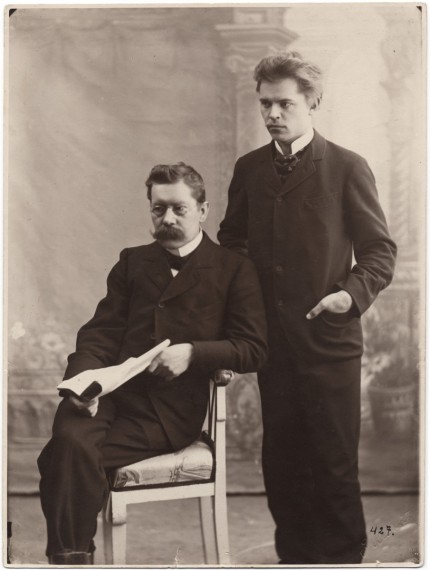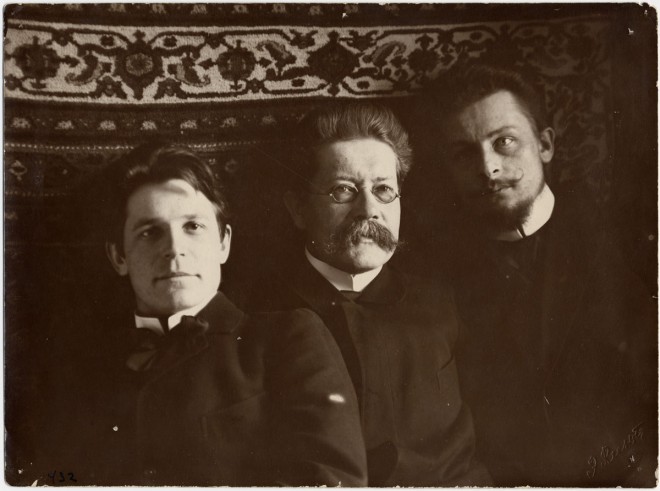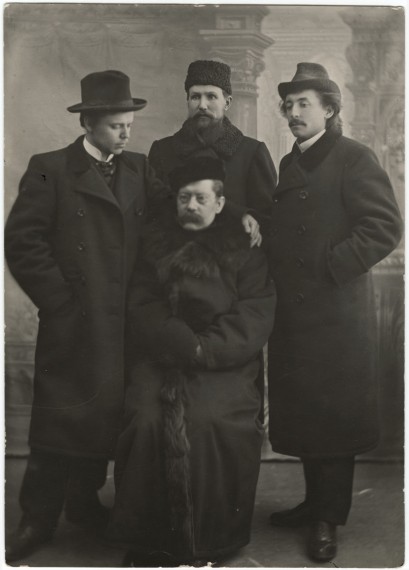Author: Maija Ārena.
Materials used from the collection of The Literature and Music Museum.
Rūdolfs Blaumanis loved people, and that was seen in his work and his life.
Rūdolfs Blaumanis at the flat of Oskars Rāviņš in St Petersburg, 1901˗1903. Unknown photographer

The yard of Rūdolfs Blaumanis home, "Braki," 2015. Photo by Maija Ārena
Blaumanis always had a very nuanced set of emotions when it came to the characters of his books. Each time that he wrote a new one, Blaumanis joked that he felt “heavy feet”. The writer loved to think carefully about what he would write by wandering through his room or outdoors. When writing funny materials, Blaumanis laughed and laughed, and when he wrote sad things, he wept, and his tears freely fell.

A 100-step path at "Braki," 1959. The writer strolled there and found ideas for his work. Unknown photographer
When writing the play “Prodigal Son”, (Pazudušais dēls) Blaumanis wept along with Krustiņš and thought and thought about whether the character could remain alive. He decided in the end that Krustiņš must die. This was a process which sometimes led to comical situations. Shepherdess Ieva was herding cows near the forest and noticed the man walking through the forest, waving his hands and talking and yelling to himself. The young girl was frightened and ran to her mother, who laughed and said “Well, he is preparing a new play.”

Rūdolfs Blaumanis and Kārlis Skalbe, c 1903. Photo by Jānis Rieksts
Rūdolfs Blaumanis was sensitive and sincere in relations with everyone whom he met. He particularly helped young writers who were known as Blaumanis’ literary foster sons. Kārlis Skalbe was one who received very sincere support from Blaumanis, including advice and, sometimes money. Skalbe later wrote that Blaumanis had a simple and deeply humane world view. This is seen in something which the author himself once said:
“How can I love humanity which I have not seen if I do not love the person who is near to me? Help a person, and you will have helped humanity.”
Rūdolfs Blaumanis in the flat of Janis Rozentāls, December 1907. Photo by Jānis Rieksts. On the reverse is the note "Last image of Blaumanis, December 1907.

Aleksandrs Būmanis, Rūdolfs Blaumanis and Jānis Greste in the flat of Janis Rozentāls, December 1907. Photo byJānis Rieksts.
Blaumanis helped people in very simple ways. He served lunch or dinner to his guests, who most often were poor young authors. If he knew that a friend was facing difficulties, Blaumanis offered him a job at a newspaper, including the need to translate texts. In his memoir, writer Jānis Akuraters recalled: “I can say that during the toughest moments, when no one offered me his hand, Blaumanis was the one who was never far from me even though he had lots of work to do, was sometimes poor himself and sometimes was even sick.”

Rūdolfs Blaumanis and his friends ˗ poet Kārlis Skalbe, teacher Kārlis Dzenis and artist Oskars Šteinbergs, 1904˗1905. Photo by Jānis Rieksts.
Materials used from the collection of The Literature and Music Museum.